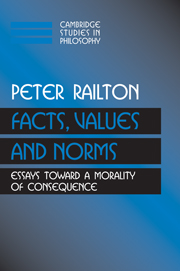Book contents
- Frontmatter
- Contents
- Foreword
- Part I Realism about Value and Morality
- Part II Normative Moral Theory
- 6 Alienation, Consequentialism, and the Demands of Morality (1984)
- 7 Locke, Stock, and Peril: Natural Property Rights, Pollution, and Risk (1985)
- 8 How Thinking about Character and Utilitarianism Might Lead to Rethinking the Character of Utilitarianism (1988)
- 9 Pluralism, Dilemma, and the Expression of Moral Conflict (1992, 2001)
- Part III The Authority of Ethics and Value – The Problem of Normativity
- Index
7 - Locke, Stock, and Peril: Natural Property Rights, Pollution, and Risk (1985)
Published online by Cambridge University Press: 18 December 2009
- Frontmatter
- Contents
- Foreword
- Part I Realism about Value and Morality
- Part II Normative Moral Theory
- 6 Alienation, Consequentialism, and the Demands of Morality (1984)
- 7 Locke, Stock, and Peril: Natural Property Rights, Pollution, and Risk (1985)
- 8 How Thinking about Character and Utilitarianism Might Lead to Rethinking the Character of Utilitarianism (1988)
- 9 Pluralism, Dilemma, and the Expression of Moral Conflict (1992, 2001)
- Part III The Authority of Ethics and Value – The Problem of Normativity
- Index
Summary
INTRODUCTION
Lockean natural rights theories have long been associated with laissez faire policies on the part of the government, in large measure because of the sanctity they accord to individual rights, especially private property rights. However, I will argue that if one attempts to apply such theories to moral questions about pollution, they present a different face, one set so firmly against laissez faire – or laissez polluer – as to countenance serious restriction of what Lockeans have traditionally taken to be the proper sphere of individual freedom.
Curiously, Lockean theories also face a challenge from the opposite direction. They may be inadequately restrictive concerning the imposition upon others of unwanted risks that do not eventuate in actual property damage. As we will see, this challenge should be especially troubling for those who hold that Lockeanism gives expression to the Kantian idea of respect for persons.
I will consider various ways in which one might attempt to modify classical Lockeanism to avoid these difficulties, but it will emerge that these modifications generally raise more problems than they solve for the Lockean and result in views that lack much of the intuitive appeal of more orthodox Lockeanism.
In short, I will argue that Lockeanism, classical or revisionist, may be incapable of striking an appropriate balance between restrictiveness and permissiveness in matters involving pollution and risk. This failure raises doubts about the adequacy of a Lockean framework to our moral universe. A simple, appealing picture of morality informs much contemporary thought and action.
- Type
- Chapter
- Information
- Facts, Values, and NormsEssays toward a Morality of Consequence, pp. 187 - 225Publisher: Cambridge University PressPrint publication year: 2003
- 2
- Cited by



